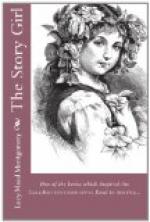“There can’t be anybody in the house,” said Felicity.
“Well, here’s the key—go and see for yourself,” said Peter.
Felicity had no intention of going and seeing.
“I think you boys ought to go,” she said, retreating behind the defence of sex. “You ought to be braver than girls.”
“But we ain’t,” said Felix candidly. “I wouldn’t be much scared of anything real. But a haunted house is a different thing.”
“I always thought something had to be done in a place before it could be haunted,” said Cecily. “Somebody killed or something like that, you know. Nothing like that ever happened in our family. The Kings have always been respectable.”
“Perhaps it is Emily King’s ghost,” whispered Felix.
“She never appeared anywhere but in the orchard,” said the Story Girl. “Oh, oh, children, isn’t there something under Uncle Alec’s tree?”
We peered fearfully through the gloom. There was something—something that wavered and fluttered—advanced—retreated—
“That’s only my old apron,” said Felicity. “I hung it there to-day when I was looking for the white hen’s nest. Oh, what shall we do? Uncle Roger may not be back for hours. I can’t believe there’s anything in the house.”
“Maybe it’s only Peg Bowen,” suggested Dan.
There was not a great deal of comfort in this. We were almost as much afraid of Peg Bowen as we would be of any spectral visitant.
Peter scoffed at the idea.
“Peg Bowen wasn’t in the house before your Uncle Roger locked it up, and how could she get in afterwards?” he said. “No, it isn’t Peg Bowen. It’s something that Walks.”
“I know a story about a ghost,” said the Story Girl, the ruling passion strong even in extremity. “It is about a ghost with eyeholes but no eyes—”
“Don’t,” cried Cecily hysterically. “Don’t you go on! Don’t you say another word! I can’t bear it! Don’t you!”
The Story Girl didn’t. But she had said enough. There was something in the quality of a ghost with eyeholes but no eyes that froze our young blood.
There never were in all the world six more badly scared children than those who huddled in the old King orchard that August night.
All at once—something—leaped from the bough of a tree and alighted before us. We split the air with a simultaneous shriek. We would have run, one and all, if there had been anywhere to run to. But there wasn’t—all around us were only those shadowy arcades. Then we saw with shame that it was only our Paddy.
“Pat, Pat,” I said, picking him up, feeling a certain comfort in his soft, solid body. “Stay with us, old fellow.”
But Pat would none of us. He struggled out of my clasp and disappeared over the long grasses with soundless leaps. He was no longer our tame, domestic, well acquainted Paddy. He was a strange, furtive animal—a “questing beast.”




